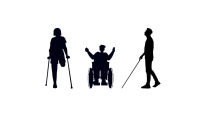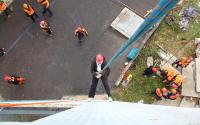29 May 2006James Randerson
Humanity has reached a "defining moment" in our dominion over the planet and our ability to destroy it, according to the head of the Royal Society, Britain's premier scientific institution. "The 21st century is the first in the Earth's history where one species has our planet's future in its hands and could jeopardise life's immense potential," Lord Rees told an audience at the Hay festival yesterday.
The eminent physicist, who is Astronomer Royal, said scientific advances had made it much easier for individuals to commit devastating acts of terror on a much greater scale than 9/11, using for example biological weapons.
"In a global village there will be global village idiots. And with this power, just one could be too many," he said. These might not be fundamentalists, but those with the mentality of a computer virus designer or arsonist, he added. "Even a single person will have the capacity to cause massive disruption through error or through terror. We are kidding ourselves if we think that technical education leads to balanced rationality."
In 2003 Lord Rees pessimistically offered a $1,000 (£539) wager that bioterror or bioerror would unleash a catastrophic event claiming 1 million lives or more in 20 years. Potential bio or cyber terrorists were much harder to keep track of than nuclear weapons proliferation without intrusive surveillance, he said. "There's real concern about whether our civilisation can be safeguarded without us sacrificing too much in terms of privacy, diversity and individualism."
His lecture, entitled "Twenty-first century science: hopes fears and ethical challenges", was loosely based on his book Our Final Hour. Introducing the talk, the broadcaster Jon Snow described him as "the Isaac Newton of our age". Lord Rees criticised George Bush for likening the terror threat to that from communism. "I think to regard this as analogous to the cold war confrontation is itself aggravating the situation. It is not appropriate to regard the problems we face now as a single coherent threat."
Politicians should do more to counter the danger posed by climate change, "ravaging" the biosphere. He called for massive investment in technological solutions such as biofuels. "They deserve a priority and commitment from governments akin to that accorded to the Manhattan project to build the first atom bomb or the Apollo moon landing project in the 60s."
In an apparent swipe at colleagues such as Richard Dawkins and Lewis Wolpert who have launched blistering attacks on religion, Lord Rees said he felt it was "not helpful" to cast religion as anti-science. "Among scientists there are adherents to a variety of religions. Creationism is not compatible with science, but many people hold to religious views and religious attitudes which are fully compatible ... There should be, at the very least, peaceful coexistence between science and most organised religion." Lord Rees describes himself as a "practising, but non-believing Christian". Church-going "was a custom of my tribe and I stick with it".
The lecture was held in honour of the Polish nuclear physicist Joseph Rotblat, who died last year. An early participant in the Manhattan project, he left once it became clear Hitler had abandoned plans to develop a nuclear weapon. He became a vigorous anti-nuclear campaigner and founded the WMD Awareness Programme which sponsored the lecture.
Today at Hay
· Steve Jones The biologist does his bit for the Enlightenment, explaining, should it be necessary, why Creationism is wrong and evolution right
· Christopher Hitchens The Hay stalwart looks at The Rights of Man: its publication in 1791, and its subsequent significance, as well as its importance in modern debates about human rights. Later in the day he shares a platform with the Vanity Fair editor Graydon Carter and the Guardian's columnist Gary Younge
· Margaret Atwood The author talks about her new short story collection
· Carmen Posadas, Rafael Reig and Jorge Franco Three of the new wave of Spanish-language novelists, from Uruguay, Spain and Colombia respectively, discuss their work
· Seamus Heaney The hottest ticket at the festival. The poet will read from his new collection District and Circle
· Al Gore The former US vice-president swoops into Hay tomorrow to talk about what he calls the "planetary emergency" of global warmingCharlotte Higgins






